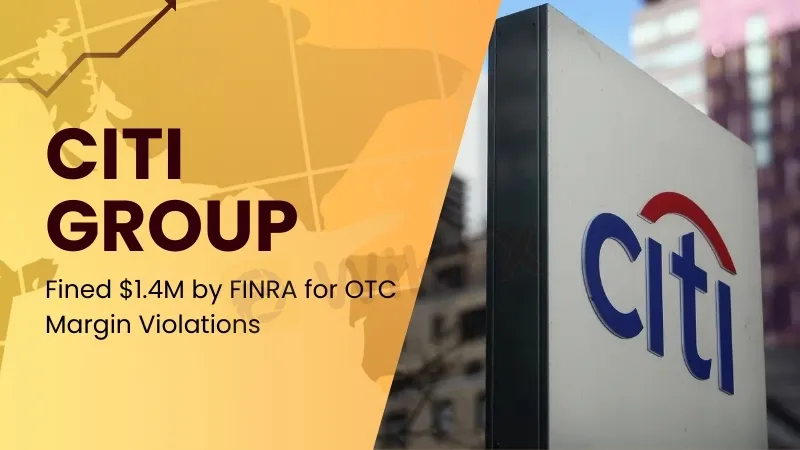Citigroup Fined $1.4M by FINRA for OTC Margin Violations
Sommario:Citigroup Global Markets fined $1.4M for violating FINRA's rules on OTC margin collection, emphasizing the need for regulatory compliance in financial reporting and securities.

Citigroup Global Markets Inc. (CGMI) has agreed to pay a substantial $1.4 million punishment after an inquiry by the Financial Industry Regulatory Authority (FINRA). This fine is part of a settlement resolving CGMI's failure to collect necessary margins on over-the-counter (OTC) stock option transactions, which lasted over a decade.
FINRA Imposes Penalties for Long-Standing Margin Deficiencies
The infractions began in October 2012, when CGMI, one of the world's biggest investment companies, failed to routinely collect initial and maintenance margins on OTC stock option transactions with two related organizations. CGMI formerly computed its margin needs manually using reports. However, this procedure was halted in September 2012 owing to a change in management of its Margin Operations team. This disturbance in their system resulted in major compliance violations.
For almost eight years, CGMI lacked a sufficient method for calculating and collecting the appropriate margins on these contracts. This delay lasted until March 2021, when the business manually began computing margin needs after detecting the compliance infringement. By failing to collect the requisite margins, CGMI violated FINRA Rules 4210 and 2010, both of which are critical laws meant to keep financial markets stable and safeguard investors.
Massive Margin Deficits Identified
An internal probe revealed the full scope of the firm's compliance failure. From March to May 2020, CGMI's margin deficits varied from $16 million to $2.2 billion. The firm's inability to collect the requisite margins on OTC stock option transactions with its associated firms resulted in significant shortcomings, raising concerns about regulatory compliance and financial reporting.
While CGMI's internal net capital was enough to overcome these inadequacies throughout the sample period, the inability to comply with regulatory standards had major consequences for market openness and accountability. Another linked business had margin shortfalls on nine separate occasions within the same time period, ranging from $1 million to $81.1 million.

Financial Violations and Improper Credit Extension
Another important problem resulting from CGMI's inability to collect margins was the inappropriate provision of credit to related firms. Because the business did not collect the required margins for OTC stock options, the associated companies gained by not having to deposit extra cash or securities; this circumstance breached fundamental laws, including Exchange Act § 7(c) and Regulation T, governing credit extension in securities trading.
The firm's OTC stock option transactions for related businesses were performed in cash accounts rather than margin accounts, which violated FINRA regulatory rules. This error exposed the firm's inability to follow recognized financial compliance procedures, creating dangers to its associated firms and the larger financial industry.
Overstated Net Capital and Inaccurate Reporting
CGMI's inability to collect the requisite margins also had an impact on its financial reporting. The company's failure to account for margin deficits in its net capital calculations resulted in severe overstatements in its financial statements. Between March and May 2020, CGMI exaggerated its net capital by up to $2.2 billion. This erroneous financial reporting violates Exchange Act Rule 15c3-1(c), a critical rule governing broker-dealers' financial integrity.
Furthermore, CGMI's general ledger and aggregate indebtedness calculations needed to be corrected owing to a failure to account for margin shortfalls. These mistakes also pertained to the firm's FOCUS reports, which were submitted with FINRA and had improper net capital estimates. As a result, CGMI was found to have violated many FINRA rules, including 4511 and 2010.
Remediation and Automated Compliance Solutions
When CGMI discovered these substantial compliance issues in February 2021, it took urgent action to resolve the situation. The firm conducted a comprehensive internal investigation and reported its findings to FINRA. As part of its remedial activities, CGMI began manual computations of the appropriate margins, ensuring that the defects no longer impacted its associated firms. In May 2022, the business adopted an automated margin calculation method for future OTC stock option transactions, providing further protection against compliance breaches.
The desire to use automated margin calculation systems reflects the increased need for automated compliance solutions in the financial services sector, which ensure accuracy, transparency, and conformity to regulatory requirements. This change is intended to avoid such infractions in the future and restore investor trust in the company's operations.
Regulatory Consequences and Broader Implications
While the $1.4 million penalties and censure are serious, this case raises wider questions about financial regulatory compliance. This serves as a timely reminder to financial professionals about the need to have strong margin collection and financial reporting processes. Regulatory authorities, like FINRA, play an important role in keeping institutions responsible for any departure from set norms.
This case emphasizes the need to follow regulatory frameworks for institutional investors, compliance officers, and legal professionals in the securities industry in order to avoid financial fines and protect market integrity. As financial markets grow more complicated, with institutions operating in global jurisdictions such as the United States, United Kingdom, Hong Kong, and Singapore, regulatory compliance has never been more important.
For detailed insights on Citigroup's regulatory challenges and their commitment to compliance, visit the Citigroup page on WikiFX. Stay informed about the latest developments in the financial industry!

WikiFX Trader
FXTM
FOREX.com
Exness
DBG Markets
ATFX
EBC
FXTM
FOREX.com
Exness
DBG Markets
ATFX
EBC
WikiFX Trader
FXTM
FOREX.com
Exness
DBG Markets
ATFX
EBC
FXTM
FOREX.com
Exness
DBG Markets
ATFX
EBC
Rate Calc

